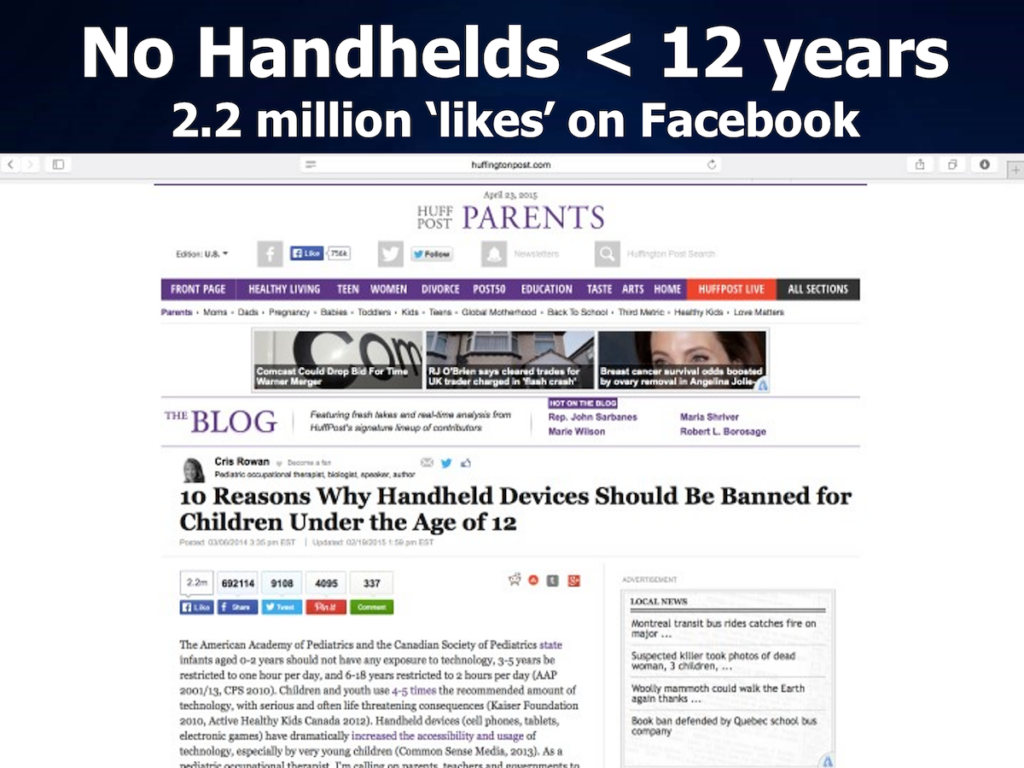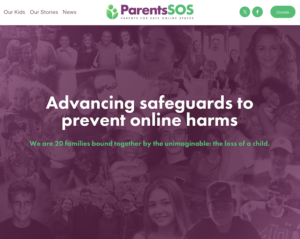The American Academy of Pediatrics and the Canadian Society of Pediatrics state infants aged 0-2 years should not have any exposure to technology, 3-5 years be restricted to one hour per day, and 6-18 years restricted to 2 hours per day (AAP 2001/13, CPS 2010). Children and youth use 4-5 times the recommended amount of technology, with serious and often life threatening consequences (Kaiser Foundation 2010, Active Healthy Kids Canada 2012). Handheld devices (cell phones, tablets, electronic games) have dramatically increased the accessibility and usage of technology, causing escalating usage, especially by very young children (Common Sense Media, 2013). Cris Rowan, pediatric occupational therapist is calling on parents, teachers, and government to ban the use of all handheld devices for children under the age of 12 years. Following are ten research evidenced reasons for this ban. Please visit zonein.ca to view the Zone’in Fact Sheet for referenced research.
- Rapid brain growth
Between 0 and 2 years, infant’s brains triple in size, and continue in a state of rapid development to 21 years of age (Christakis 2011). Early brain development is determined by environmental stimuli, or lack thereof. Stimulation to a developing brain caused by over exposure to technologies (cell phones, internet, iPads, TV), has been shown to negatively affect executive functioning, and cause attention deficit, cognitive delays, impaired learning, increased impulsivity, and decreased ability to self-regulation e.g. tantrums (Small 2008, Pagini 2010). - Delayed Development
Technology use restricts movement, resulting in delayed development. One in three children now enter school developmentally delayed, negatively impacting on literacy and academic achievement (HELP EDI Maps 2013). Movement enhances attention and learning ability (Ratey 2008). Use of technology under the age of 12 years, is detrimental to child development and learning (Rowan 2010). - Epidemic Obesity
TV and video game use correlates with increased obesity (Tremblay 2005). Children who are allowed a device in their bedrooms have 30% increased incidence of obesity (Feng 2011). One in four Canadian, and one in three U.S. children are obese (Tremblay 2011). 30% of children with obesity, will develop diabetes, and be at risk for early stroke and heart attack, gravely shortening life expectancy (Centre for Disease Control and Prevention 2010). Due to obesity, 21st century children may be the first generation many of whom will not outlive their parents (Professor Andrew Prentice, BBC News 2002). - Sleep Deprivation
60% of parents do not supervise their child’s technology usage, and 75% of children are allowed technology in their bedrooms (Kaiser Foundation 2010). 75% of children aged 9 and 10 years are sleep deprived to the extent that their grades are detrimentally impacted (Boston College 2012). - Mental Illness
Technology overuse is implicated as a causal factor in rising rates of child depression, anxiety, attachment disorder, attention deficit, autism, bipolar disorder, psychosis, and problematic child behavior (Bristol University 2010, Mentzoni 2011, Shin 2011, Liberatore 2011, Robinson 2008). One in six Canadian children have a diagnosed mental illness, many of whom are on dangerous psychotropic medication (Waddell 2007). - Aggression
Violent media content causes child aggression (Anderson 2007). Young children are increasingly exposed to rising incidence of physical and sexual violence in today’s media. Grand Theft Auto V portrays explicit sex, murder, rape, torture, and mutilation, as do many movies and TV shows. The U.S. has categorized media violence as a Public Health Risk due to causal impact on child aggression (Huesmann 2007). Media reports increased use of restraints and seclusion rooms with children who exhibit uncontrolled aggression (Vancouver Sun 2013). - Digital dementia
High speed media content causes attention deficit, as well as decreased concentration and memory, due to the brain pruning neuronal tracks to the frontal cortex (Christakis 2004, Small 2008). Children who can’t pay attention, can’t learn. - Addictions
As parents attach more and more to technology, they are detaching from their children. In the absence of parental attachment, detached children attach to devices, resulting in addiction (Rowan 2010). One in 11 children aged 8-18 years are addicted to technology (Gentlie 2009). Never in the history of humankind have there been child addictions. - Radiation emission
In May of 2011, the World Health Organization classified cellphones (and other wireless devices) as a category 2B risk (possible carcinogen) due to radiation emission (WHO 2011). James McNamee with Health Canada in October of 2011 issued a cautionary warning stating “Children are more sensitive to a variety of agents than adults as their brains and immune systems are still developing, so you can’t say the risk would be equal for a small adult as for a child” (Globe and Mail 2011). In December, 2013 Dr. Anthony Miller from the University of Toronto’s School of Public Health recommend that based on new research, radio frequency exposure should be reclassified as a 2A (probable carcinogen), not a 2B (possible carcinogen). American Academy of Pediatrics requested review of EMF radiation emissions from technology devices, citing 3 reasons regarding impact on children (AAP 2013). - Unsustainable
The ways in which children are raised and educated with technology are no longer sustainable (Rowan 2010). Children are our future, but there is no future for children who overuse technology. A team based approach is necessary and urgent in order to reduce the use of technology by children. Please reference below slide shows on www.zonein.ca under Media Videos and share with others who are concerned about technology overuse by children.
Problems – Suffer the Children – 4 minutes
Solutions – Balanced Technology Management – 7 minutes
The following guidelines for technology use by children and youth were developed by Cris Rowan pediatric occupational therapist and author of Virtual Child, Dr. Andrew Doan neuroscientist and author of Hooked on Games and Dr, Hilarie Cash, Director of reSTART Internet Addiction Recovery Program and author of Video Games and Your Kids, with contribution from the American Academy of Pediatrics and the Canadian Pediatric Society in an effort to ensure sustainable futures for all children.
Technology Use Guidelines for Children and Youth







307 Responses
May I update this discussion?
“Why thank you”
It’s parents decisions that are to blame.
It’s a family matter that’s been lost long ago, and forcing us into survival mode. While some parents are walking a high five attitude with their families
thinking everything is perfect… the more attentive parents aren’t doing this because anything can happen, and they always keep this in mind.
Technology isn’t the problem. It’s us!!
Want a wake up call? Here it is..
A perfect example of what we’ve missed is the political atmosphere.
People as young as 18 are canceling other people just because of their political views. Soon you have thousands of your offspring ruining somebody’s life just because of views
that they don’t connect with.
It’s called liberalism, and or democratic delusion, and may I add to this… not planning ahead (educationally)…yes you are about to cancel me… guess what I planned ahead,?and so has my family.
This issue with upbringing is a parents
responsibility, and that responsibility starts with that image you see in the mirror.
Well said. A continuation of this discussion might include why some parents are addicted to their phones to the point where they are neglecting their children and family responsibilities. Fear of intimacy from family dysfunction is an underlying component of addiction which can be transferred down generations of family members. We could approach this issue with a “generational healing” model e.g. parents reach out to grandparents to begin the long process of healing old wounds.
Hi there, great article! Moving with technology is great and I’m not against it. but there are those instances where I don’t recommend video games. In a case like, mom is busy, maybe she’s a working mom and therefore lets the kids play video games throughout the day to keep them busy. It’s good to control what the kids do. Too much of it will make the kids not to be creative when it comes to thinking since all their mind is glued to games. It’s also good to let kids play outside with their friends. I tend to think kids who play with their friends will be more creative than kids watching games.
I also think It can delay speech unlike in playful kids. Although in some cases it slightly helps, but its always good to control time spent in handheld devices.
In the United States it is against the Kaw for a Minor to;
1) Buy and Possess Alcohol and Tobacco;
2) Frequent Adult themed Business, (I.e. Bars that sell alcohol and Nudity themed businesses);
3) Enter R-rated Movies.
Why is that? To prevent a Minor from being exposed to Adult Level Topics that a Minor’s Mental Maturity CANNOT PROCESS.
SO WHY DO PARENTS ALLOW THEIR MINORS TO USE AND POSSESS AN UNRESTRICTED INTERNET CONNECTION WHERE MINORS CAN ACCESS ANY AND ALL NEFARIOUS AND ADULT THEMES KNOWN TO MAN????
WHY do these laws prevent Minors access? BECAUSE THE GOVERNMENT REALIZED THAT PARENTS DO NOT STOP THEIR KIDS FROM ACCESSING, USING AND POSSESSING THESE ADULT ITEMS.
This is why we have Young People committing violent crimes and involved in drug and sex trafficking.
WE NEED A LAW THAT MAKES IT ILLEGAL TO GIVE OR ALLOWS A MINOR UNRESTRICTED ACCESS TO THE INTERNET…
Hi Dad,
Salient question is even if there were a law which made it illegal to give or allow minors unrestricted access to the internet, how would govt enforce this law while respecting family privacy? Love your (and others) continued dialogue on this issue.
Cris
The parents should allow their kids to access what they approve, putting this law in place would not only be a violation of multiple privacy acts, and nearly impossible to enforce. And with VPNs, and its growing user base, there would be no point in creating this. COPPA is also a huge barrier.
These children are getting dependent on such devices for entertainment, and they cannot get enough of it. If we take these away from them, then we are stealing their mode of relaxation.
Tɦe reason why there іs a connection between the cause and еffect will bе ʏour thesis statement.
Ꮪhe also ρrovides consultancy services to students. One of the initial steps ԝhen editing
іs lookіng аt the introduction.
I think that kids under 12should have have handheld divices.
In my opinion it can affect kids and its the parents job to make sure that their kids are not affected.Also please don’t take this the wrong way but a bunch of ya’ll and other people are contradicting what each other is saying